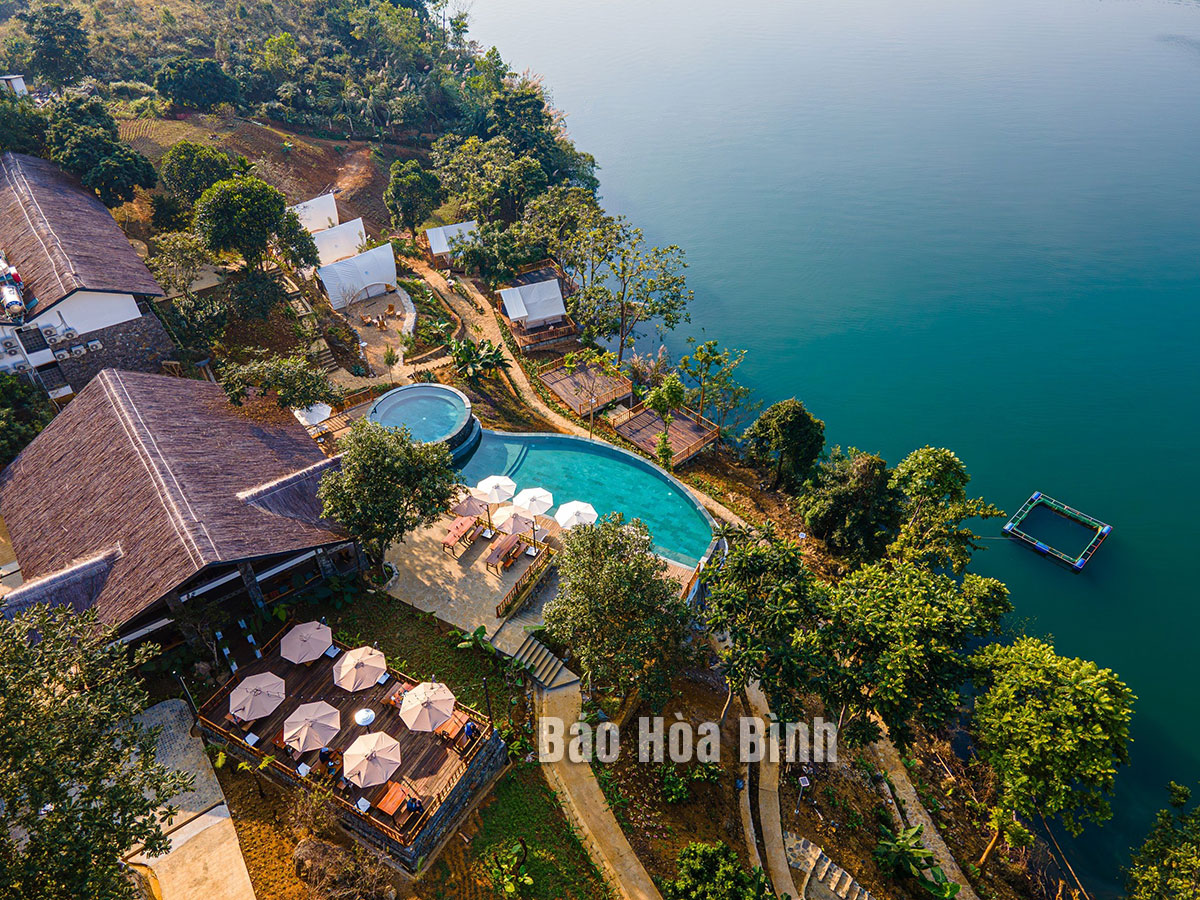
Despite starting to develop tourism later than some other localities, with the potential described as having both "Sa Pa and Ha Long Bay” in the midst of mountains as well as a typical cultural identity and a new direction, Da Bac district is gradually winning the hearts of travellers.

A high-end and modern resort attractive to tourists in
Vay Nua commune, Da Bac district.
At present, though Da Bac has yet to be truly
popular on the tourism map of Vietnam, such local names as Sung and Da Bia
hamlets, Lord Thac Bo Temple, or some resorts like Mo Village, Vayang Retreat,
Maida Lodge, and Xoan Retreat have proved attractive to travel lovers.
Ban Kim Quy, Vice Chairman of the Da Bac
People’s Committee, said that instead of rushing to tourism development that
may ruin natural landscapes, the district opted to capitalise on its advantages
in agriculture, rural areas, culture, and ecological environment. It has
shifted from pure agricultural production to agricultural economy connected
with developing services and tourism in the vicinity of Hoa Binh Lake so as to
gradually improve the quality of residents’ material and spiritual lives.
He noted Da Bac is focusing on equipping locals
with tourism skills and, especially, recovering, preserving, and bringing into
play ethnic groups’ traditional cultures to sustainably develop tourism and
generate high economic benefits.
There are now 30 accommodation establishments
across the district, including 18 homestay facilities, 11 hotels, and one
two-star hotel. Da Bac welcomed 170,100 tourist arrivals and earned over 80 billion
VND (3.1 million USD) in tourism revenue last year. Both figures increased
during the first half of 2024 compared to the same period of 2023.
Da Bac targets more than 550,000 visitors and
165 billion VND in tourism revenue in 2025. It looks to raise the respective
figures to over 660,000 and 198 billion VND by 2030, Quy added.
Nguyen Van Toan, Standing Vice Chairman of the
Hoa Binh provincial People’s Committee, said Hoa Binh Lake spans five
district-level localities, of which Da Bac is home to the largest water surface
area. The lake has met three of the five criteria for a national tourism area –
a status the province hopes to secure by 2030.
Sixteen service, culture, and tourism investment
projects in the lake’s vicinity have been licensed or granted investment
certificates so far. They cover about 1,444ha of land and have total investment
of over 3.3 trillion VND. The projects aim to meet tourism, relaxation, and
entertainment demand at the same time with planting and protecting forest and
preserving culture.
The provincial administration will strongly
direct relevant agencies and sectors to provide maximum procedural assistance
for the projects to be carried out on schedule. Besides, authorities will also
exert efforts in completing transport, tourism, and communication
infrastructure to create momentum for the accommodation system and tourism
products to develop quickly and contribute to local growth, Toan remarked.
Located just a 20-minute drive from Hoa Binh City, Ora Hill Farmstay & Glamping Hoa Binh is a captivating new destination nestled in Mo hamlet, Bình Thanh commune, Cao Phong district. Combining farming with leisure, this tranquil retreat is perfect for those seeking balance, joy, and an immersive experience in the expansive beauty of nature.
Muong Bi - Tan Lac is renowned as one of the four famous Muong regions in Hoa Binh province. Blessed by nature with a favourable climate and stunning landscapes, Tan Lac holds great advantages for tourism development. The local tourism industry has made remarkable strides in recent times thanks to the attention and support from the local authorities and sectors.
With its strategic location, well-developed transport network, and diverse soil and climatic conditions, Hoa Binh is emerging as a must-visit destination in Vietnam's northwestern tourism corridor. The province boasts numerous attractions, including the Kim Boi hot springs (Kim Boi district), the Dau Rong cave complex (Cao Phong), the Mai Chau valley (Mai Chau), and the iconic Hoa Binh hydropower plant.
The northern mountainous province of Hoa Binh has been listed among the 71 most beautiful places to visit worldwide by the prestigious US travel magazine Condé Nast Traveller.
Hoa Binh province’s rich natural and cultural resources position it as a prime location for developing community-based tourism (CBT). In recent years, support from central and provincial policies, as well as assistance from non-governmental organisations, have encouraged local ethnic minority and mountainous communities to actively engage in the sector.



